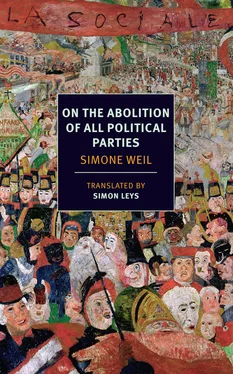At election time, if contributors to a journal are political candidates, it should be forbidden for them to invoke their connection with the journal, and it should be forbidden for the journal to endorse their candidacy, to support it directly or indirectly, or even to mention it. Any ‘Association of the friends’ of this sort of journal should be forbidden. If any journal were ever to prevent its contributors from writing for other publications, it should be forced to close.
All this would require a complete set of press regulations, making it impossible for dishonourable publications to carry on with their activity, since none would wish to be associated with them.
Whenever a circle of ideas and debate would be tempted to crystallise and create a formal membership, the attempt should be repressed by law and punished.
Naturally, clandestine parties might appear. It would not be honourable to join them. The members of these underground parties would no longer be able to turn the enslavement of their minds into a public show. They would not be allowed to make any propaganda for their party. The party would have no chance of keeping them prisoner of a tight web of interests, passions and obligations.
Whenever a law is impartial and fair, and is based upon a clear view of the public interest, easily grasped by everyone, it always succeeds in weakening what it forbids. The penalties that are attached to infringements scarcely need be applied: the mere existence of the law is itself enough to neutralise its target. This intrinsic prestige of the law is a reality of public life which has been too long forgotten and ought to be revived and made good use of. The existence of clandestine parties should not cause significant harm — especially compared with the disastrous effects of the activities of legal parties.
Generally speaking, a careful examination reveals no inconveniences that would result from the abolition of political parties. Strange paradox: measures like this, which present no inconvenience, are also the least likely to be adopted. People think, if it is so simple, why was it not done long ago?
And yet, most often, great things are easy and simple.
This particular measure would exert a healthy, cleansing influence well beyond the domain of public affairs, for the party spirit has infected everything.
The institutions that regulate the public life of a country always influence the general mentality — such is the prestige of power. People have progressively developed the habit of thinking, in all domains, only in terms of being ‘in favour of’ or ‘against’ any opinion, and afterwards they seek arguments to support one of these two options. This is an exact transposition of the party spirit.
Just as within political parties, there are some democratically minded people who accept a plurality of parties, similarly, in the realm of opinion, there are broad-minded people willing to acknowledge the value of opinions with which they disagree. They have completely lost the concept of true and false.
Others, having taken a position in favour of a certain opinion, refuse to examine any dissenting view. This is a transposition of the totalitarian spirit.
When Einstein visited France, all the people who more or less belonged to the intellectual circles, including other scientists, divided themselves into two camps: for Einstein or against him. Any new scientific idea finds in the scientific world supporters and enemies — both sides inflamed to a deplorable degree with the partisan spirit. The intellectual world is permanently full of trends and factions, in various stages of crystallisation.
In art and literature, this phenomenon is even more prevalent. Cubism and Surrealism were each a sort of party. Some people were Gidian and some Maurrassian. To achieve celebrity, it is useful to be surrounded by a gang of admirers, all possessed by the partisan spirit.
In the same fashion, there was no great difference between being devoted to a party or being devoted to a church — or being devoted to anti-religion. One was in favour of, or against, belief in God, for or against Christianity, and so on. When talking about religion, the point was even reached where one spoke of ‘militants.’
Even in school, one can think of no better way to stimulate the minds of children than to invite them to take sides — for or against. They are presented with a sentence from a great author and asked, ‘Do you agree, yes or no? Develop your arguments.’ At examination time, the poor wretches, having only three hours to write their dissertations, cannot, at the start, spare more than five minutes to decide whether they agree or not. And yet it would have been so easy to tell them, ‘Meditate on this text, and then express the ideas that come to your mind.’
Nearly everywhere — often even when dealing with purely technical problems — instead of thinking, one merely takes sides: for or against. Such a choice replaces the activity of the mind. This is an intellectual leprosy; it originated in the political world and then spread through the land, contaminating all forms of thinking.
This leprosy is killing us; it is doubtful whether it can be cured without first starting with the abolition of all political parties.
1. Written in 1943. [Translator’s note]
THE IMPORTANCE OF SIMONE WEIL
France offered a rare gift to the contemporary world in the person of Simone Weil. The appearance of such a writer in the twentieth century was against all the rules of probability, yet improbable things do happen.
The life of Simone Weil was short. Born in 1909 in Paris, she died in England in 1943 at the age of thirty-four. None of her books appeared during her own lifetime. Since the end of the war her scattered articles and her manuscripts — diaries, essays — have been published and translated into many languages. Her work has found admirers all over the world, yet because of its austerity it attracts only a limited number of readers in every country. I hope my presentation will be useful to those who have never heard of her.
Perhaps we live in an age that is atheological only in appearance. Millions were killed during the First World War, millions killed or tortured to death in Russia during and after the revolution; and countless victims of Nazism and the Second World War. All this had to have a strong impact upon European thinking. And it seems to me that European thinking has been circling around one problem so old that many people are ashamed to name it. It happens sometimes that old enigmas of mankind are kept dormant or veiled for several generations, then recover their vitality and are formulated in a new language. And the problem is: who can justify the suffering of the innocent? Albert Camus, in The Plague , took up the subject already treated in the Book of Job. Should we return our ticket like Ivan Karamazov because the tear of a child is enough to tip the scale? Should we rebel? Against whom? Can God exist if he is responsible, if he allows what our values condemn as a monstrosity? Camus said no. We are alone in the universe; our human fate is to hurl an eternal defiance at blind inhuman forces, without the comfort of having an ally somewhere, without any metaphysical foundation.
But perhaps if not God, there is a goddess who walks through battlefields and concentration camps, penetrates prisons, gathers every drop of blood, every curse? She knows that those who complain simply do not understand. Everything is counted, everything is an unavoidable part of the pangs of birth and will be recompensed. Man will become a God for man. On the road toward that accomplishment he has to pass through Calvary. The goddess’s name is pronounced with trembling in our age: she is History.
Leszek Kolakowski, a Marxist professor of philosophy in Warsaw, [1] states bluntly that all the structures of modern philosophy, including Marxist philosophy, have been elaborated in the Middle Ages by theologians and that an attentive observer can distinguish old quarrels under new formulations. He points out that History, for instance, is being discussed by Marxists in the terms of theodicy — justification of God. [2]
Читать дальше












